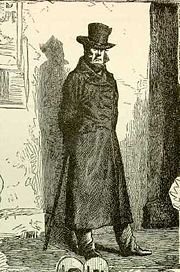
The title is an allusion to the book/movie/musical Les Miserable and was the theme of the policeman Inspector Javert as he relentlessly tracked down the thief-turned-good-guy Jean Valjean. In the end, it is Javert who cannot change, and it is Valjean who, through a gracious impartation of mercy, is transformed.
Within each of us is a Javert, who speaks to us relentlessly, and persuasively. This voice in our head insists that, no matter how much we might long for change, “People like you will never change.” And that refrain is all to easy to believe when we see in our lives, or in the lives of those we love, patterns of failure and frustration.
The model with which we are programmed to attempt change is a model of moral effort. If I am to change my moral behavior, I must determine to do better, and then do better. Tim Keller, though, has used Robert Louis Stevenson’s The Strange Case of Dr. Jeckyll and Mr. Hyde to prod us into confronting the fallacy of this. The chemical mix which Dr. Jeckyll would drink had the effect of suppressing his ‘good’ part and giving his ‘evil’ part free reign. Once he came to loathe that behavior, he resolved to stop drinking the juice. That was his moral effort. Once he did that, he forgot the evil in him, took pride in his righteous behavior, and began to look down in judgment upon those who were not as “decent” as he. And at that moment, deeply enmeshed in his pride, the darkness of his heart became clear to him, and he became Mr. Hyde with no juice and no return.
What Keller intends for us to see (and I, too, as I ‘stole’ his allusion to Jeckyll and Hyde when I preached on Romans 6 and 7 last year) is that the result of moral effort is not to change the heart, but is rather to suppress one expression of sin for another.
So, do we believe that people like us will never change?
No. People like us can change. The gospel simply reminds us that change does not come unaided. If we are to change, it will be a change worked in us by the power of God, rooted in the Gospel of his Son, and produced by the inworking of his Holy Spirit.
These thoughts, when I preached them, spawned a series of questions from a member of our church who was struggling, as we all should do, with how this process of change looks in a real life. Particularly, she was struggling with where in this process of change resides our own effort, if any, and if we exert any effort, are we in that way again depending upon the law or upon morality to effect the change.
I confess, these are complicated questions, which have been given much better answers by people much more qualified than I. However, what I’d like to do over the next several weeks is to share portions of the correspondence which dealt with these issues. My intention is to post a new segment in this conversation each Friday. (I have my correspondent’s permission to do this.)
My hope is that this will be helpful to many of us. It is also my hope that as you read you might have the courage to post the questions which these thoughts generate out of your own experience. Post your questions (annonymously, if you like), or email me privately. I’d like this to be a helpful dialogue on an issue lying in the center of our Christian experience.
I, unlike Javert, believe that people like you, and even me, really do have hope for change.
